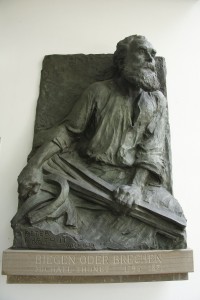
On the last Sunday of the school summer holidays over 35 production companies in and around Kassel stage an annual collective "Open Day" - Blauer Sonntag.
The name may be an extremely complex and over ambitious pun - the idea is however much more agreeable and this year we took the opportunity to visit Thonet in Frankenberg(Eder).
For not only was Blauer Sonntag the first "official" event for the new Thonet Wohnshowroom, but visitors also had the rare opportunity to observe the Thonet wood bending process.
The Thonet Wohnshowroom may not have been designed by Herzog and de Meuron; but that doesn't make it any less of a visual illusion. Dating from 1889 the half-timbered house stands next to the Thonet factory and is the former family home of company directors Claus, Peter and Philipp Thonet. The Thonet Wohnshowroom isn't especially large; however, all internal connecting doors are open which, coupled to the well-considered removal of a couple of internal walls and wonderful window placement, produces the effect of a space about twice the size that it actually is. As with the VitraHaus, the Thonet Wohnshowroom has been conceived as a product showroom; however, as the Thonet Wohnshowroom is a real house, with real proportions, the effect is in many ways better. The natural size limitations of the rooms creating a more authentic and personal atmosphere. One highlight for us, for example, was f/p design's System 7000 shelving which shone a lot more in Frankenberg than was possible in Milan.
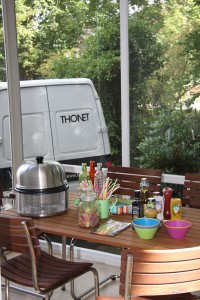
In the publicity press release Phillip Thonet states that he finds the conversion so appealing he could well imagine spending an afternoon alone in the Thonet Wohnshowroom.
We too.
And not just on account of the Cobb Grill in the conservatory.
Equally impressive is the Thonet Museum. When we spoke with Thonet creative director James Irvine in Milan he enthused about the number of fascinating items in the Thonet archive. Yeah Yeah! we thought, nice soundbite for the camera. It took less than five minutes in the Thonet Museum for us to realise that he genuinely wasn't exaggerating. Alone admiring and investigating the 1884 "Day Bed" took us some 20 minutes. Just genius.
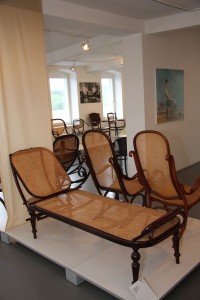
If we did have one moan it was the somewhat "over-optimistic" Verner Panton corner: Panton and Thonet may have worked together on numerous projects, but not that many ever reached production. And "not many" is in itself extremely optimistic.
The real highlight of the afternoon however was the Biegerei. The English term "bending shop", though correct, somehow doesn't seem to do the institution justice.
As any fool know, in the 1840s, and after 20 years research, Michael Thonet perfected a process for bending wood to create furniture - and with chairs such the (2)14, more or less, invented the mass production of furniture.
The real beauty of a chair such as the 214, however, is the hidden complexity in a design that ouses simplicity and an innocent "anyone could make that" charm.
Watching the Thonet workers in action makes it clear just how brilliant Michael Thonet's process is.
In modern industrial design a lot of time, sweat and money is spent refining processes and materials to improve stability and reduce volume. Michael Thonet did exactly the same. And not only the end result of his life's work has changed little over the years.
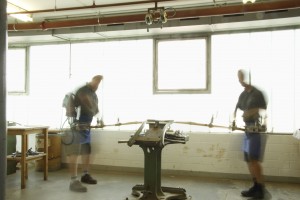
The tables on which the hot wood is bent have changed little since Michael Thonet devised his process in the1840s.
The old Biegerei in Frankenberg has changed little since Georg Thonet rebuilt the bombed factory in the early 1950s.
Even the surnames of the workers who bend the wood have changed relatively little over the decades.
But perhaps most comforting is the fact that in all probability it never will change.
It's barely imaginable that robots and computers will ever be able to make a chair as complex as the 214 and so in the future he who buys a Thonet bent wood chair can be certain of getting a 100% hand produced product with an inbuilt, inherent 160 year old quality guarantee.
And for those of you who don't know what the twist with Michael Thonet's concept is, we'll reveal it soon.

Thonet is one of those companies that it is all too easy to ignore; but only because their products are so widely copied. And that is wrong. Thonet remain the company who helped introduced series production, who made quality furniture accessible for a mass public and who were at the forefront of two of the most important innovations in furniture design: "bent wood" and "bent steel tube".
And perhaps more importantly they remain a family business who exist as an integral part of the community in which they are based.
A day such a Blauer Sonntag is therefore important not only as it allows the company to explain their background and philosophy, but also because they can show customers just what you get for money.
Each of the ca. 400 visitors who visited Thonet on Sunday and who saw the sweat on the Biegerei worker's brows now knows that.
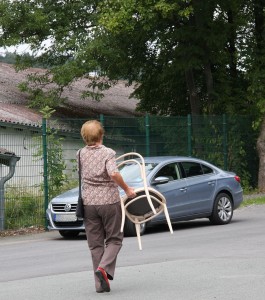
And so with our camera memory cards full of data, our stomachs full of cake and a storm front hard on our heels, we headed home through the rolling green valleys of North Hessen.
And for all who missed Blauer Sonntag; Thonet are hosting a special factory sale on September 25/26. The Biegerei is sadly not open that weekend; however the Thonet Museum and Thonet Wohnshowroom will be - in addition to the chance to purchase Thonet seconds and other "not for retail sale" items at reduced prices.
Further photos can be found on the smow facebook page